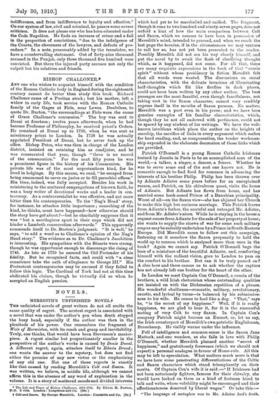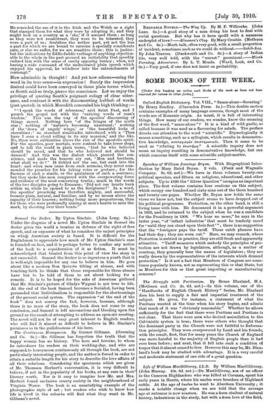NOVELS.
MEREDITH'S UNFINISHED NOVEL.t THE unfinished novels of great writers do not all excite the same quality of regret. The acutest regret is associated with a novel that was under the author's pen when death stopped the busy hand, especially if the author was then in the plenitude of his power. One remembers the fragment of Weir of Hermiston, with its reach and grasp and inevitability. Truly, one thinks, that would have been Stevenson's master- piece. A regret similar but proportionately smaller in the perspective of the author's works is caused by Denis Duval. A different regret, again, attaches itself to Edwin Drood ; one wants the answer to the mystery, but does not find either the promise of any new virtue or the emphasising of any old one. Not one of these regrets is exactly like that caused by reading Meredith's Celt and Saxon. It was written, we believe, in middle life, although we cannot affirm this in the absence of any word of explanation in the volume. It is a story of scattered moods and divided interests • The life and Times of Bishop Challoner, 1601-1781. By Edwin H. Burton, D.D. 2 vols. London : Longman and Co. (24e.1 t Celt and Baton. By George Meredith. London Constable and Co. [es.] which had yet to be marshalled and unified. The fragment, though it runs to two hundred and ninety-seven pages, does not unfold a hint of how the main comparison between Celt and Saxon, which we assume to have been in possession of Meredith's mind, intended to proceed, and when we reach the last page the heroine, if in the cirumstances we may venture to call her so, has not yet been presented to the reader. Possibly Meredith did not see his way clearly himself, and put the novel by to await the flash of clarifying thought which, as it happened, did not come. For all that, there are many exquisite expressions in the book of that "comic spirit" without whose presidency in fiction Meredith felt that all words were wasted. The discussions on racial characteristics, with the delicate invasions of illuminating half-thoughts which flit like fireflies in dark places, could not have been written by any other author. The best passages are the most fanciful, even though fancifulness, not taking root in the Saxon character, cannot very credibly express itself in the mouths of Saxon persons. No matter. Meredith was a. poet even in his prose ; and we have here genuine examples of his familiar characteristics, which, though they be not all endowed with pertinence, could not be spared by any student of his writings. We have the well- known intuitions which place the author on the heights of seership, the sacrifice of links in every argument which makes for hard reading, and, as compensation, the tender workman- ship expended in the elaborate decoration of those links which are provided.
Patrick O'Donnell is a young Roman Catholic Irishman trained by Jesuits in Paris to be an accomplished man of the world,—a talker, a singer, a dancer, a fencer. Whether be was to serve some end of the sect one knows not. He is romantic enough to find food for romance in advancing the interests of his brother Philip. Philip has been thrown over by Adiante A.dieter some years before for an unexplained reason, and Patrick, on his chivalrous quest, visits the home of Adiante. But Adiante has flown from home, and has married some hook-nosed Prince of a Danubian principality. Worst of all—on the Saxon view—she has abjured her Church to make this high but ominous marriage. This Patrick learns from Adiante's father, the scornful and outraged Mr. Adister, and from Mr. Adister's niece. While he is staying in the house a request comes from Adiante for the sale of her property at home; she wants to supply the sinews of war for some such military coup as maybe suitably undertaken by aPrince in South-Eastern Europe. Did Meredith mean to follow out this campaign, fastening on it somehow the Saxon propensity to hold the world up to ransom which is analysed more than once in the book P Again we cannot say. Patrick O'Donnell begs the loan of a miniature of the beautiful Adiante, and, comforting himself with the radiant vision, goes to London to pass on the comfort to his brother. But can it be truly passed on P A clue here and there causes us to ask whether the rapture has not already left one brother for the heart of the other.
In London we meet Captain Con O'Donnell, a cousin of the brothers, a wild Irish rhetorician whose outstanding qualities are insisted on with the Dickensian repetition of a phrase. His wonderful ebullience—romantic, military, revolutionary, caustic, and lyrical by turns—is balanced by his submissive- ness to his wife. He comes to heel like a dog. " That," says he, " is the secret of my happiness." Well, if it is really happiness, we are glad to hear it, for it is the successful mating of very Celt to very Saxon. In Captain Con's company Patrick might become an Emmet, or, let us say, the Irish counterpart of Meredith's own patriotic Englishman, Beauchamp. He visibly warms under the influence.
Full of intelligence and common-sense is the Saxon Jane Mattock, and one wonders, as she falls in love with Philip O'Donnell, whether Meredith planned another "secret of happiness," and gratuitously forswears (which we should not expect) a personal analogue in favour of Home-rule. All this may be left to speculation. What matters much more is that we have here some penetrating differentiations of the Celtic and Saxon characters which stand triumphantly on their merits. Of Captain Con's wife it is said :—" If Irishmen had not been notoriously fighters, famous for their chivalry, she would have looked on them as a kind of footmen hired to talk and write, whose volubility might be encouraged and their affectionateness deserved by liberal wages." Or take this :— "The language of metaphor was to Mr. Adister fool's froth.
He conceded the use of it to the Irish and the Welsh as a right that stamped them for what they were by adopting it; and they might look on a country as a she,' if it amused them : so long as they were not recalcitrant, they were to be tolerated, they were a part of us; doubtless the nether part, yet not the less a part for which we are bound to exercise a specially considerate care, or else we suffer, for we are sensitive there : this is justice: but the indications by fiddle-faddle verbiage of anything objection- able to the whole in the part aroused an irritability that speedily endued him with the sense of sanity opposing lunacy ; when, not having a wide command of the undecorated plain speech which enjoyed his approval, he withdrew into the entrenchments of contempt."
How admirable in thought ! And yet how odious—using the word in its true sense—in expression ! Surely the impression desired could have been conveyed in those plain terms which, as South said so truly, pierce the conscience. Let ns enjoy the privilege of quoting South's poignant eulogy of clear utter- ance, and contrast it with the disconcerting hubbub of words (just quoted) in which Meredith concealed his high thinking :- " I speak the words of soberness,' said Saint Paul, and I preach the gospel not with the enticing words of man's wisdom.' This was the way of the apostles' discoursing of things sacred. Nothing here of the fringes of the north star ; ' nothing of nature's becoming unnatural;' nothing of the down of angels' wings,' or the beautiful locks of cherubims : ' no starched similitudes introduced with a Thus have I seen a cloud rolling in its airy mansion,' and the like. No, these were sublimities above the rise of the apostolic spirit. For the apostles, poor mortals, were content to take lower steps, and to tell the world in plain terms, that he who believed should be saved, and that ho who believed not should be damned.' And this was the dialect which pierced the con- science, and made the hearer's cry out, Men and brethren, what shall we do ? ' It tickled not the ear, but sunk into the heart: and when men came from such sermons, they never com- mended the preacher for his taking voice or gesture ; for the fineness of such a simile, or the quaintness of such a sentence ; but they spoke like men conquered with the overpowering force and evidence of the most concerning truths ; much in the words of the two disciples going to Emmaus ; 'Did not our hearts burn within us, while he opened to us the Scriptures ? ' In a word, the apostles' preaching was therefore mighty, and successful, because plain, natural, and familiar, and by no means above the capacity of their hearers ; nothing being more preposterous, than for those who were professedly aiming at men's hearts to miss the mark, by shooting over their heads."







































 Previous page
Previous page